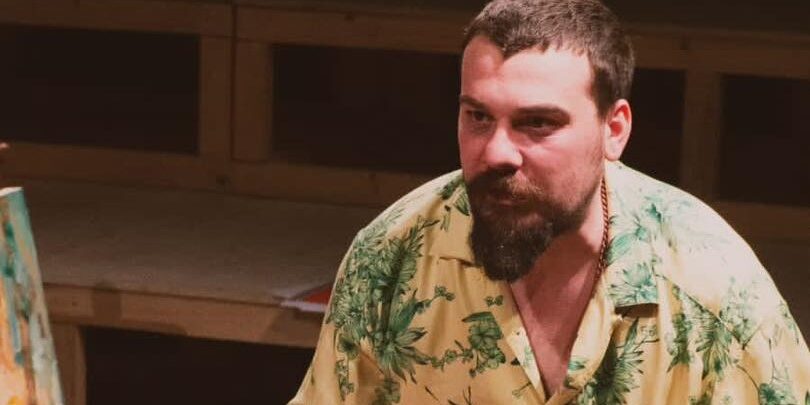Gjilan City Theater, premiere 28th April 2023
Regarded as a modern classic, David Mamet’s 1975 play American Buffalo takes place in a junk shop. The stage is filled with old furniture. There’s a broken door covered in newspaper, delicate porcelain figurines and old paintings. There are pictures of women on the walls. You can almost smell the must and wood. American Buffalo a famously tense play and the song ”Camel’’ by Rajaz playing in the background helps create this sense of tension.
The play explores the dynamics between three men. Donny (Jurgen Marku), the shop owner, has sold a coin – a buffalo nickel – but now thinks he sold it too cheaply and wants to steal it back. Teach (Blendi Arifi) comes up with a plan. Bobby (Florent Salihu), who works for Donny, offers to help but Teach doesn’t want to involve Bobby, as he does not trust him. Teach becomes even more suspicious of him when an ex-cellmate, who was also supposed to be involved in the robbery, is nowhere to be found and Bobby’s story about his whereabouts is inconsistent. The planned burglary starts to fall apart before even starting.
The three actors each bring their unique approach to their roles, successfully portraying the complexity and fragility of the characters. Marku is charismatic and appealing as Donny, giving him a sense of stability and dependability that one might associate with a family man, despite not having a family of his own. Salihu captures the essence of an eager-to-please young man, giving him an agreeable nature, like an intern fresh out of school who wants to make a good impression on the boss. Arifi is captivating as Teach, bringing a sense of unpredictability to the stage. Teach is a man with a complex personality and a fragile ego who gets angry every time things don’t go the way he wants or when he thinks he doesn’t get the respect that he deserves, but he is also very vulnerable and loyal to his friend Donny. The two men struggle for dominance but also, ironically, for validation from each other as well. As a result, there is always some sort of tension between them. Bobby on the other hand speaks in a very hesitant way, which reflects his status within a group.
David Mamet is known for his blunt and aggressive style of dialogue, to the point that it is known as “Mamet speak.” Arifi brought this quality to the style on this show as well. Teach in particular repeats himself a lot, using vulgar language and speaking in a confrontational way.
The way the men speak about women is particularly vulgar and objectifying. They refer to women only in a sexualized manner, as if they are inferior to men. While it can be argued that Mamet’s intention was to accurately show the language of working-class men during the time period in which the play is set, it is important to recognize the harm that is still perpetuated by the oversexualization and objectification of women in society. I was waiting for Ruth – the woman who they mention a lot – to show up and give her version of the situations that they were describing, but she never did. Her absence on the stage felt like a clear message that women’s stories and perspectives are not important in the world of this play. It was only the men’s interpretation that mattered.
Arifi’s masterful direction brought the characters and their struggles to life, exposing the hypocrisy of power dynamics in wider society. The play depicts the way men often forcefully assert their authority over others, even if they lack control over themselves.
It’s a play that is really worth seeing both for the quality of the performances and the way it depicts power and control, challenging the audience to consider how these two concepts can be like two sides of the same coin.
Credits:
Author: David Mamet// Director Blendi Arifi //Cast: Jurgen Marku, Blendi Arifi, Florentt Salihu
Further reading: review of AYLAN at Gjilan City Theater
Fatlinda Daku is a human rights activist who is currently working as a researcher and freelance journalist. She studied Political Science at the University of Prishtina and has working experience in the civil society sector.








